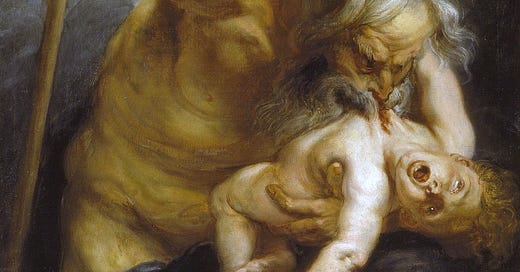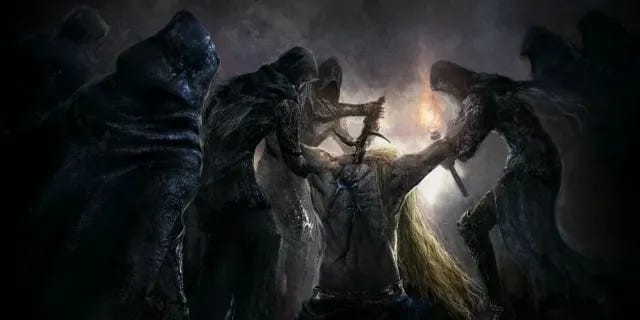I had a realisation, based on what I wrote in the articles titled, “Overcoming Kronos and the restoration of Arta”, “The True Apollonian-Dionysian Dichotomy”, “The Kronian Social Order” and “The Forgiveness of Persephone”. Something that really blew me away, as I had been playing around with these ideas for a while, though the full extend of it had not yet dawned upon me fully. This being, that what people are actually fighting in the culture war is not just a projection of the shadow, as the shadow is the primal nature and wounded inner child. They do indeed project that onto the world, and see that as various things. Yet as I had realised earlier it is the Kronian ego that projects its own nature onto it. As it is the ego-persona that in the first place thinks in dualities, caused the shadow (through the imposition of the dismemberment of the psyche by the social order), and actually does the behaviours that it blames the shadow for. Which btw is repressed and thus fuels ego-inflation.
The Kronian Ego and Its Role in Dualistic Perception
All this boils down to perception, as the ego self-deceives itself as pure, whilst it does what it says those who it projects what it fears in itself do. So it is thus not really the shadow and what is repressed that is the real issue. But the repression itself, and how the ego perceives it, which feeds into the very things it fears manifesting in the world. It does not matter what you name it, all of that is actually the same egoic structure that people are rebelling against, whilst they project their shadow onto that structure and end up reinforcing their super ego, to be perceived as pure. Which creates a recursive feed back loop, which not only keeps the repression in place, but also both the inner and outer conflict. Meaning that it creates a spiral of repression and division.
Something we clearly have seen playing out within the culture. And in that sense the feedback loop begins with the Kronian ego (the rigid super ego aligned ego), which is dualistic by nature. It seeks to maintain a self-image of purity and control while also meanwhile repressing aspects of the self (the shadow) that do not fit this image.
Psychological Dismemberment and Judgment
What now becomes important in this is the dismemberment of the psyche, which ties to the symbolic dismemberment of the infant Zagreus by the titans, where they ate him and only his heart remained. The Titans here represent psychological complexes (unconscious patterns of behaviour caused by trauma), that together are also aligned with Kronos or the super-ego (inner critic). In psychological terms, the super-ego is the internalized societal or moral code, often shaped by early childhood trauma, societal trauma (norms), and authority figures. It functions as an internal "judge" that enforces ideals of perfection and purity, pushing the ego to behave in ways that conform to these impossible standards. When this moralistic structure is rigid, it can become a source of self-criticism, guilt, and repression, contributing significantly to the cycle we've described. The super-ego plays a central role in this repression, the process through which parts of the self are deemed unacceptable and are pushed into the unconscious.
Moral Judgment: The super-ego holds strict moral standards, often informed by external authorities of modernity & societal trauma (familial, cultural and societal). It condemns impulses, thoughts, or desires that don't align with these standards.
Self-Censorship: The super-ego demands that the ego suppress or deny these "unacceptable" aspects, leading to a rejection of certain parts of the self. Where this repression might include emotions, desires, or behaviours deemed "immoral" or "unacceptable," like assertiveness, sexuality, or emotions.
Formation of the Shadow: These repressed aspects, which the super-ego judges as "wrong" or "bad," then form the shadow, the parts of the psyche that are disowned but still exert influence.
So once the shadow is formed through repression, the super-ego’s role in projecting those disowned parts onto others becomes more evident. And it is the super-ego's need for moral purity can lead to projecting the repressed, shadow aspects onto external targets. This may manifest as projecting "badness" onto others, blaming them for the traits or behaviours that the individual deems unacceptable in themselves.
Judgment and Blame: The super-ego demands that the individual separate themselves from these projected aspects, making them seem external and other. For example, a person who has repressed their own aggressive tendencies might accuse others of being violent or controlling, or someone who feels shame about their desires might project their sexual repression onto others.
Moral Superiority: By projecting the shadow, the ego inflates itself with the belief that it is morally superior to the perceived "other." This helps maintain the super-ego's image of righteousness.
The Cycle of Projection and Ego-Inflation
The super-ego’s judgments also then can fuel ego-inflation, a psychological process in which the ego inflates its sense of importance and superiority. So then when the ego successfully projects its shadow onto others and reinforces its own sense of purity, it experiences a temporary boost in self-worth. This inflated ego believes it is "better" than those it has demonized. This inflated self-image, created by the super-ego, becomes a false self. A self built on denial and repression rather than authenticity. The individual is no longer in touch with their true, integrated self and instead identifies with an idealized, sanitized version of who they think they "should" be. This inflated ego feels the need to defend itself against any threat to its "purity" or perceived righteousness. Any challenge to this self-image (such as a recognition of one's own flaws or shadow) threatens the ego's fragile sense of superiority and triggers defensiveness or aggression.
The Recursive Feedback Loop of Repression and Division
And it is the super-ego which thus drives the recursive feedback loop of repression, projection, and ego-inflation. The super-ego deceives the person into thinking they are "pure" and "good," while the repressed aspects of the self continue to manifest in projected form. The person believes they are doing "good" by attacking the shadow in others, not realizing that it is their own repressed material they are fighting. So as the ego inflates, the super-ego demands more purity and control, leading to increased repression of anything that could threaten this ideal. This repression only strengthens the shadow, making it harder to confront and integrate. The more the ego projects, the more the super-ego reinforces the belief that "the other" is the source of all evil or immorality. This projection creates division, leading to conflict and further distancing from the repressed parts of the self.
With this the cycle continues, both individually and collectively, as the ego fights to maintain its self-image of purity and righteousness, while meanwhile the shadow remains suppressed and projected outward. So to counteract the discomfort of repression, people may overcompensate by adopting extreme behaviours or beliefs. These can be various forms of repression that can occur within individuals, below are various examples.
Repressed Aggression
Surface Belief: Peace, non-violence, and tolerance.
Repressed Emotion: Anger, frustration, or the urge to stand up for oneself.
Overcompensation: Might adopt extreme pacifist stances or even moral superiority, framing any confrontation or disagreement as an attack on peace. They may passively resist (e.g., through subtle sabotage, sarcasm, or "sabotaging peace" by becoming emotionally volatile when cornered), or they may explode in aggressive outbursts when the repression becomes too much to contain.
Repressed Vulnerability
Surface Belief: Self-reliance, independence, freedom from external control.
Repressed Emotion: Dependence on others, need for support, or fear of rejection.
Overcompensation: They may push the narrative of extreme autonomy, leading them to reject collaboration or even compassion. They might present a front of overblown self-sufficiency, but deep down, they harbour a hidden desire for connection or support, leading to feelings of loneliness and alienation.
Repressed Desire for Control
Surface Belief: Equality, empowerment, strong anti-hierarchy.
Repressed Emotion: Desire for power and control.
Overcompensation: Their behaviour can become hyper-regulated and also controlling. For example, they may enforce ideological purity within the group, accusing others of negative labels when confronted with disagreements. This desire to maintain ideological control can mirror the actual hierarchical power dynamics they claim to oppose.
Repressed Fear of Rejection
Surface Belief: purity, righteousness, conformity.
Repressed Emotion: Fear of rejection, guilt, or a need to be accepted.
Overcompensation: They might adopt extreme beliefs about the "right way to live" in an attempt to prove their worthiness of love and avoid rejection. They may project an image of superiority, focusing on judgmental attitudes toward those who don't conform to their beliefs. This overcompensation allows them to feel the illusion of security and belonging within the group while avoiding confronting their own deep-seated insecurities and need for true acceptance.
Repressed Emotions of Victimhood
Surface Belief: Justice, fighting for rights, restoring order.
Repressed Emotion: Anger, resentment, or feelings of helplessness.
Overcompensation: People may internalize the role of the victim and, in doing so, can become hyper-focused on perceived slights or injustices, leading to a martyr complex or sense of superiority through suffering. They may also adopt a mentality of perpetual grievance that focuses on highlighting oppression at every turn, possibly missing opportunities for healing or collective empowerment.
Yet it is this inability to confront and integrate the shadow, that keeps the individual trapped in cycles of guilt, shame, and blame. Where encounters with others who embody repressed traits (real or imagined) provoke strong emotional reactions, often disproportionate to the situation. So when the ego's self-image (persona) is thus challenged, the person may double down on projection and repression to preserve their identity.
"Us vs. Them" Mentality and Its Self-Perpetuating Nature
This leads to societies splitting into "us vs. them" camps, each believing in their own moral superiority while accusing the other of embodying the worst traits. Yet the groups mimic the behaviours they condemn in their opponents (think for instance fighting authoritarianism with authoritarian tactics). Where attempts to "defeat" the perceived enemy only reinforce the dynamics of repression and projection. The recent economic, environmental, and social crises amplify this loop as people seek external scapegoats for their suffering.
Yet really the root cause of this loop is perception and repression. The repression creates the shadow and fuels the energy behind projection. Where the dualistic perception reinforces the belief in separation between self and other, good and evil, perpetuating division, which keeps the ego separate from its shadow. At its core, the Kronian ego refuses to recognize its own role in the dynamics it opposes, maintaining a false sense of purity.







